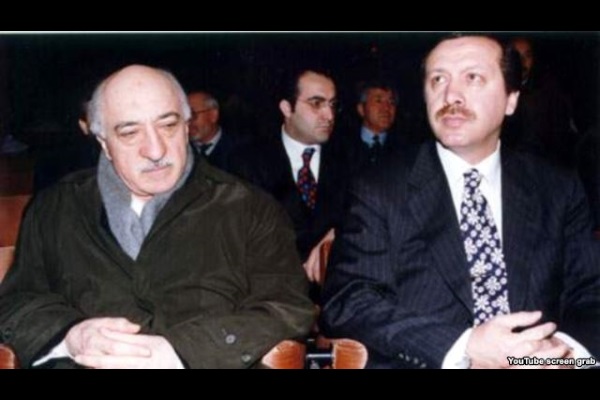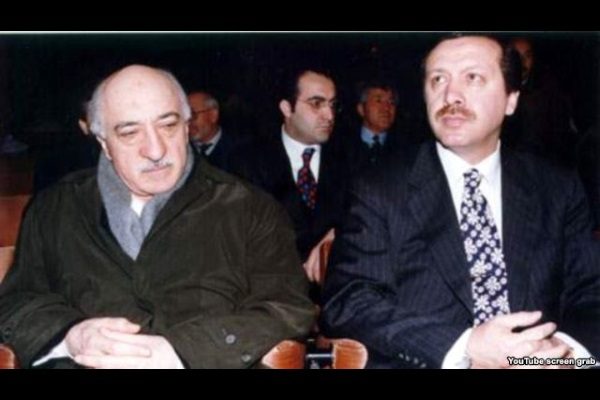

By: Abbas Djavadi
Source: RFE/RL
Since Turkey’s failed July 15 coup, the Turkish authorities have accused U.S.-based cleric Fethullah Gulen of being behind the attempted takeover of power. It is an explanation that is widely accepted across Turkey. A brief look at the history of Gulen’s movement helps explain why.
What Does The Movement Want?
Gulen was originally a supporter of Said Nursi, an Ottoman-Kurdish scholar from the Hanefi school of Sunni Islam. But in the 1970s, Gulen formed a sect of his own that people later called “Gulen Camaati” (Gulen community or movement).
Like any other Islamic sect under the strictly secular and pro-military Turkish governments, Gulen’s community was banned and operated largely underground until 1983. But, unlike other religious communities, which were mainly teaching the Koran and performing private religious prayers, Gulen’s group became increasingly politicized. Businessmen began to donate money and the movement became a political player among conservative and religious groups in Turkey.
“[Gulen] wrote at that time that he wanted to train ‘courageous, selfless men’ for society,” says Rusen Cakir, a leading expert on Turkish Islamic groups. “It was about them training and planting young people in different important layers of the government: the police, the justice system, the Interior Ministry, and even the army.”
But, unlike more transparent political parties, Gulen’s sect kept everything secret. It was never clear how many members the group had, who they were, and what exactly they were seeking to do politically. It was widely rumored that his movement, and all its related “foundations” and businesses, were getting wealthier and more and more people were joining his community, but there was little categorical evidence to support this.
How Big Is The Movement?
It is almost impossible to quantify the size of the Gulen movement’s membership or its wealth. By many estimates, over the course of some 40 years, the movement has gathered tens of thousands of supporters.
Gulen has repeatedly denied having a “network.” He has said that people may sympathize with him in any government institution even without an organized network, as is the case with other political parties. But analyst Cakir says that directing school graduates to choose positions selected by “community guides” — members of the Gulen movement who counsel younger members — was not something any other political party was doing.
Why Did The Movement Clash With The Turkish State?
In the 1970s, the government, army, and security services tried to clean up their ranks and remove those they perceived to be Gulenist “implants.” And in the 1980s, secular parties and magazines (like Nokta from 1986, which is pictured below) were warning against secret “Fethullahists” in the army.
28 Aralık 1986 tarihli Nokta Dergisi haberi: Orduya sızan dinci grup: … – https://t.co/sU00QUoZuQ @medyascopetv pic.twitter.com/mZGBky8loY
— Medyascope (@Medyascopetv) July 23, 2016
Working up the ladder in the army and civil service, Gulen supporters helped other members of the movement join their ranks. In 2010, prior to a national exam for entrance into government agencies, exam questions werereportedly communicated among Gulen movement members to ensure their passing the exam.
While Gulen was gathering and guiding supporters, his schools both in Turkey and abroad were bringing him fame and popularity. Critics say that running those successful schools was a “cover” for his “infiltration” of the government, although raising the level of Turkey’s education and culture was always one of Gulen’s stated goals.
In 1999, secret recordings of Gulen’s speeches were played on state television. In them, he called on his supporters to “silently and patiently” infiltrate government agencies and wait for “the moment” of change. “If you act too soon, you’ll have Turkish state institutions on your back,” he said.
Under increasing pressure from secular media and government, Gulen emigrated to the United States in 1999. His movement, though, kept growing.
Why Did The Relationship With Erdogan Turn Sour?
In the 2000s, Gulen already had scores of loyal supporters at high levels of the police, justice system, media, educational institutions, and even the army. He was also a close ally of Recep Tayyip Erdogan, who became prime minister in 2003. Gulen and Erdogan came from the same Islamic background, although they held different interpretations on how an Islamic movement should operate within a secular state.
Once Erdogan’s Justice and Development Party (AKP) won parliamentary elections in 2002 and built a one-party government, it was actively supported by the Gulen movement. In return, the movement and its activities were tolerated by the AKP government until 2010.
It was then that Erdogan started taking measures against the Gulen sympathizers. He began to clean up the police and his “foundation schools,” but stopped short with the military. In 2013, Erdogan completely broke with Gulen, after a series of secret audio and video recordings emerged about corruption cases in the AKP government and Erdogan’s inner circle, which he suspected were leaked by the movement.
Why Were The Gulen Supporters Detained So Quickly?
Less than 48 hours after the coup attempt began, police, security, and army forces loyal to the government detained around 7,000 suspected supporters of the Gulen movement. Over the next seven days, this number rose to more than 50,000, although some of them were later released. Media, businesses, and even schools were closed or their management taken over.
In the aftermath of the July 15 coup attempt, dozens of alleged members of the Gulen movement have admitted getting their instructions from higher ranks in the Gulen community, usually verbally or via messaging. Even a colonel did not shy away from giving instructions to his supervising general.
The immediate question for many, especially in foreign countries, was how could they identify so many of the pro-Gulen people so fast. It has been suggested, including by the EU enlargement commissioner, Johannes Hahn, that the government had prepared lists of names and institutions well before the coup attempt. Some commentators went further and suggested that the coup attempt was staged.
Given that the Gulen group has been active in Turkish political life for the last 40 years, and given Erdogan’s authoritarian tendencies, it is quite possible that the government had lists of Gulen supporters within the civil service, education system, and businesses. And it is of little doubt that they were under surveillance by security and military agencies.
According to Erdogan’s advisers, the Turkish president was planning to clean up the army in August of this year. That may have led the plotters to strike before they were ready. In his disputed secret speeches 17 years earlier, Gulen warned about the foolhardiness of striking too soon, or “you’ll have Turkish state institutions on your back.” Regardless of whether Gulen’s organization was responsible for the coup, his words were prescient.
Copyright (c) 2016. RFE/RL, Inc. Reprinted with the permission of Radio Free Europe/Radio Liberty, 1201 Connecticut Ave NW, Ste 400, Washington DC 20036.
The views expressed in this article do not necessarily reflect those of MuslimVillage.com.



